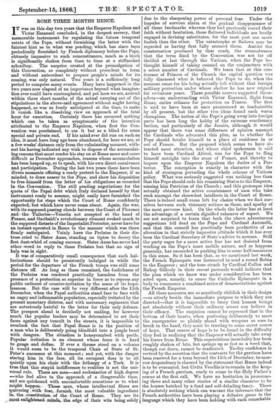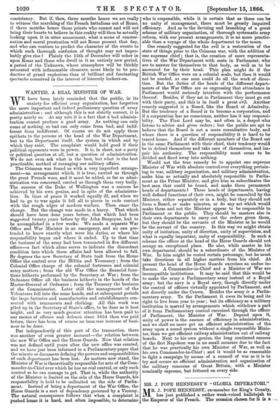ROHE TRUE MONTHS HENCE.
IT was on this day two years that the Emperor Napoleon and Victor Emanuel concluded, in the deepest secrecy, that memorable instrument for regulating the future temporal estate of the Pope, without furnishing the latter with the faintest hint as to what was pending, which has since been periodically flourished by French diplomacy before the Pope, obtusely impassive to such remonstrances, much as a birch is significantly shaken from time to time at a stiffnecked schoolboy. The surprise created at the promulgation of this Convention, so completely without precedent in form and without antecedent to prepare people's minds for its coming, was only natural. Two years is a sufficiently long period to comprise many events. Many have happened in the two years now elapsed of an importance beyond what imagina- tion ever could have contemplated, and yet here we are, arrived within three short months of the actual carrying out of the stipulations in the above-said agreement without aught having happened, as was so freely anticipated at the time, to make it vanish like a dissolving view on approach of the fatal hour ,for execution. Certainly there has occurred nothing which can be taken as. symptomatic of the intention attributed to the Emperor Napoleon, when first the Con- vention was proclaimed, to use it but as a blind for some special and private end. If his mind ever did run on such an idea, it must have long age been abandoned, for here we are, at a few weeks' distance only from the culminating moment, with- out his having indicated any wish to dispose of the accumulat- ing reasons that must render his stay on at Rome more and more difficult as December approaches, reasons whose accumulation has been heaped:up, so to speak, with his own direct connivance and participation. During the last two years there have been divers moments offering a ready pretext to the Emperor, if so minded, to draw nearer to the. Pope, and show his disposition to free himself from the letter of his obligations as recorded in the Convention. The still pending negotiations, for the quota, of the Papal debt which Italy declared herself by that instrument ready to assume, might easily have furnished the opportunity for steps :which the Court of Rome confidently expected( but which have never come about. Again, the war, with its supposed, passing clouds between the Court of Florence and the. Tuileries—Venetia not accepted at the hand of France, 04311 Gfaribahli's revolutionary element evoked much to the supposed distaste of the Imperialist Protector, never have for an instant operated in Rome, in the manner which was there firmly anticipated. Vainly have the Prelates in their dis- tress cried to Sister Anne, standing on tiptoe to descry the first dust-whirl, of coming succour. Sister Anne has never had other,avord to reply to these Prelates but that no sign of help waa in. sight.
It was of comparatively small consequence that such hal- lucinations. should be persistently indulged in while the period for the departure of the French troops was still some distance off. As long as these remained, the foolishness of the Prelates was rendered practically harmless from the presence of a protection so superior in force as to repress any public outburst of counter-irritation by the sense of its hope- lessness. But the case will be very different after the 15th December, when the Papal authorities stand face to face with an angry and inflammable population, especially irritated by the present monetary distra,ss, and with mercenary regiments that are notoriously hateful to the latter for their only defence. The prospect ahead is decidedly not smiling, for however much the popular leaders may be determined to set their faces against any tumult in the streets, it is impossible to overlook the fact that Papal Rome is in the position of a man who is deliberately going blindfold into a jungle beset with dangers.. The situation is honeycombed with perils. Popular irritation is an element whose force it is hard to gauge and define. If ever a throne stood on a volcano it would seem to be the temporal Chair of State of St. Peter's successor at this moment ; and, yet, with the danger staring him in the face, all ita occupant does is to sit quietly upon his chair with the lethargy of a Turk. It is true that this stupid, indifference to realities is not the uni- versal rule. There are men--and ecclesiastics of high degree —who feel alive to the approach of a disagreeable time, and are quickened with uncomfortable sensations as to what might happen. These men, whose intellectual fibres are quivering with fear, furnish the most valuable ingredient in the;, constitution of the- Court of Rome. They are its rnost enlightene,d, minds, the edge of their wits being solely due to the sharpening power of personal fear. Under the impulse of nervous alarm at the gradual disappearance of all those landmarks whereon they had previously rested their faith without hesitation, these fluttered individuals are busily engaged in devising substitutes, for the most part one more foolish than the other. The catastrophe at Sydow& may be regarded as having first fully aroused them. Amidst the consternation produced by that crash, the remembrance that the term fixed by the Convention was not far off thrilled at last through the Vatican, when the Pope be- thought himself of taking counsel on the conjuncture with a select number of Cardinals. We learn that at this con- ference of Princes of the Church the capital question was fully discussed what it behoved the Pope to do, when the moment came for his being actually left without that foreign military protection under whose shelter he has now reigned for seventeen years. Three possible courses suggested them- selves—an understanding with Victor Emanuel, flight from Rome, entire reliance for protection on France. The first is said to have been at once pronounced as inadmissible by all present, but the other two ideas found each warm champions. The notion of the Pope's going away into foreign parts has been long the hobby of the extreme reactionary faction, and particularly of the Jesuits, although it would appear that there was some difference of opinion amongst the Cardinals who advocated this plan, as to whether the Pope should betake himself to a place of residence in or out of France. But the proposal which seems to have at- tracted most attention, and whose chief spokesman is said to have been Cardinal Alfieri, was for the Pope to fling himself outright into the arms of France, and thereby to impose upon the Emperor Napoleon the duties of a Pro- tector. The conception is exactly in character with the kind of stratagem pervading the whole scheme of Vatican policy. What was seriously suggested was nothing less than that the Pope should cede his remaining States to the Emperor, naming him Patrician of the Church ; and this grotesque idea actually obtained the active countenance of men who take rank amongst the shrewdest intellects in the Court of Rome. There is indeed small room left for choice when we find our- selves between such visionary notions as these, and apathy of the most perverse kind. On the whole the latter has at least the advantage, of a certain dignified calmness of aspect. We are not surprised to learn that both the above adventurous suggestions fell dead on the Pope and Cardinal Antonelli, and that this council has practically been productive of no alteration in that strictly impassive attitude which it has ever been the Cardinal Secretary of State's advice to assume. Still the party eager for a more active line has not desisted from working on the Pope's more mobile nature, and as happens generally, has succeeded in pushing him to some half-measures in this sense. So it has been that, as we mentioned last week, the French Episcopate was instructed to send a round Robin to the Emperor ; and the tone struck by Cardinal Cullen and Bishop Gillooly in their recent pastorals would indicate that the plan which we know was under consideration has been acted upon, namely, to cause the Catholic Episcopate in a body to commence a combined series of demonstrations against the French Emperor. All these measures are so manifestly childish in their design —so utterly beside the immediate purpose to which they are directed—that it is impossible to fancy that human beings not absolutely without their ordinary senses can believe in their efficacy. The suspicion cannot be repressed that in the bottom of their hearts, when professing deliberately to meet the emergencies so plainly ahead with weapons so sure to break in the hand, they must be trusting to some secret source of hope. That source of hope is to be found in the difficulty they feel in realizing that the Emperor will actually take away his forces from Rome. This superstitious incredulity has been roughly shaken of late, but springs up as fast as a weed that, though cut down, cannot be eradicated. To-day confidence is revived by the assertion that the contracts for the garrison have been renewed for a term beyond the 15th of December, to-mor- row despondency is cheered by the statement that Rome indeed is to be evacuated, but Civita Vecclila is to remain in the keep- ing of a French garrison, ready to come to the Holy Father's rescue at the first call. We have no hesitation in pronounc- ing these and many, other stories of a similar character to be the hoaxes hatched by a fond and self-deluding fancy. There is absolutely nothing which can warrant the inference that the French authorities have been playing a delusive game in tha language" whieb. they have been holding with such remarkable
consistency. But if, then, three months hence we are really to witness the marching of the French battalions out of Rome, if three months hence those priests who cannot and will not bring their hearts to believe in this reality will then be actually looking upon it in utter amazement, what a scene of conster- nation and moral prostration will not Rome present that day, and who can venture to predict the character of the events to which such thorough confusion of thought may not impro- bably give rise? Plainly the 15th of December will usher in upon Rome and those who dwell in it an entirely new period, a period of the Unknown, whose atmosphere will be thickly seturated with inflammable elements, more likely to be pro- ductive of grand explosions than of brilliant and fascinating spectacles conceived in the interest of leisurely lookers-on.































 Previous page
Previous page